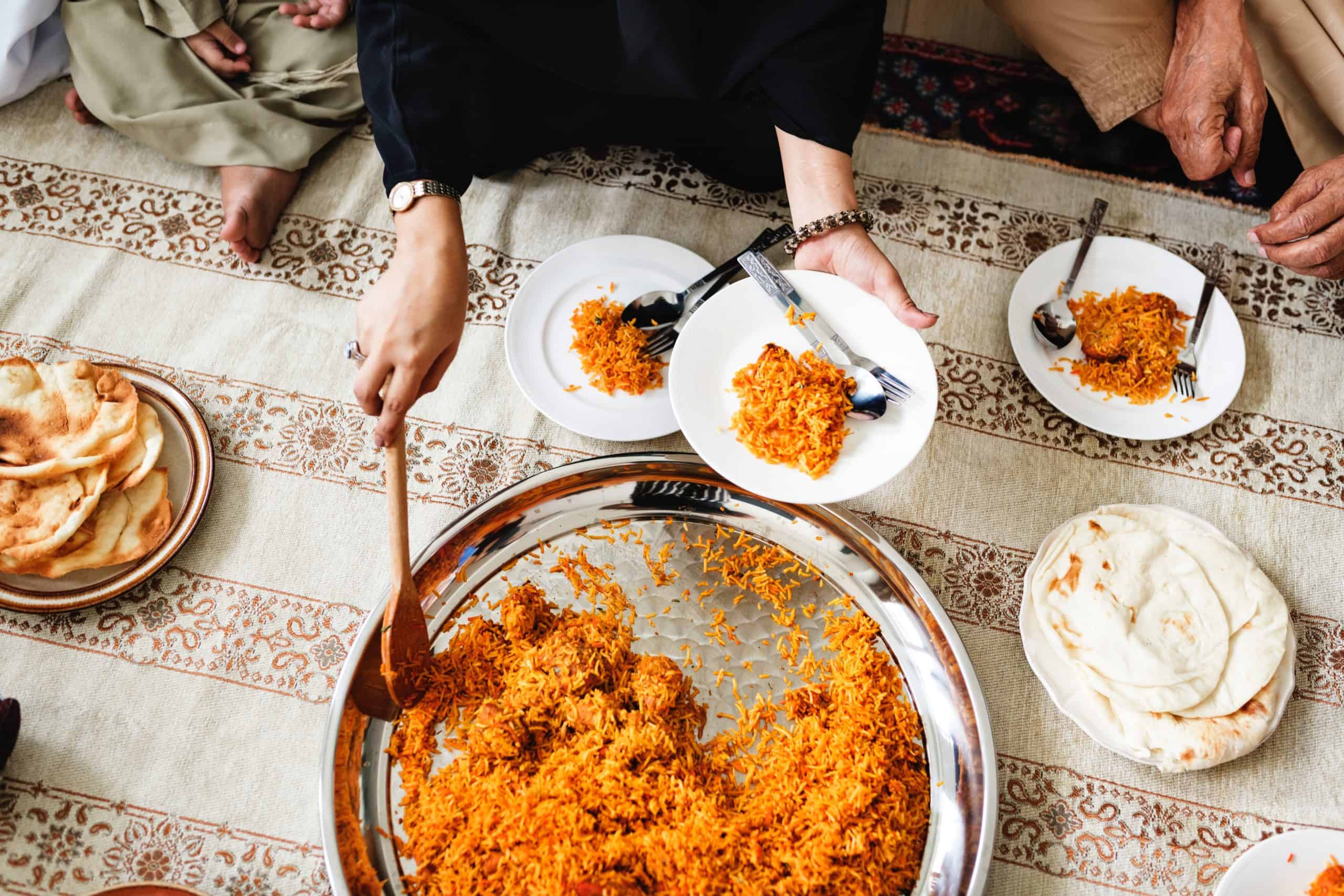10 Simple Strategies to Stay Healthy During Ramadan

Authors: Julie Wild and Yasmin Abdullah
It’s that time of year again. Long days of fasting followed by special meals with others or maybe just a savored meal from your microwave. Whatever the setting, Ramadan puts our relationship with food front and center for us to reflect on. It heightens our awareness of hunger and thirst while also challenging us to get enough sleep. So, with all of these ahead of us, is it even possible to keep Nooming? Absolutely!
1. Set realistic goals
Hitting the gym for an hour every day? Not eating an ounce of sugar? With the long days of fasting and limited hours to eat and drink, time management is a major consideration. Goals that worked for you in February might be difficult to stick with during Ramadan. A big part of staying on track is looking at how you define what that track is. For many people, weight loss during holidays simply isn’t realistic. Reframe your goals and make it a point to “maintain, not gain” this Ramadan! Still want to work out? Many Muslims work out just before Iftar or a few hours after Iftar. Do what feels best for you.
2. Create an action plan
Planning is your best strategy for keeping your health during such a busy time. Want to keep up with your activity routine? Schedule it in your calendar! Want to limit yourself to one sweet? Make a plan for how you’ll say no to seconds. Want to figure out how you’ll work or go to school, enjoy Iftars with others, AND get up on time for a healthy Suhur? Plan it out like the most Type A person you know. Plan to succeed!
3. Remember what Ramadan is all about
“Oh, I feel sick. I ate too much.” While this can be a common phrase heard at Iftar (along with the accompanying chuckles and smiles) we know that this isn’t the intention.
Ramadan is a time to reflect, go inward, and ‘give up’ our attachment to many things in this life. Whether it’s our cherished morning tea, coffee or favorite snacks, it’s an opportunity to ‘let go’ of what has become a habit and to eat more mindfully. Slow down when you are eating and take in the joy of being with others. Chewing and swallowing slowly aids digestion and helps to avoid overeating. Even though Noom is on your phone, reduce your time on mindless internet/social media and be present where you are.
4. Fiber and protein are your friends
Many Muslims use beans, whole grains, vegetables, and dairy products to get through the long days of Ramadan. Starting your day at Suhur with a high protein/high fiber meal along with ample water can keep your energy up. Ideas are veggie omelettes, fava beans, lentil soup, oatmeal, whole wheat pita bread, fresh fruit and veggies. Foods such as bananas, milk, dates, avocados, pistachios, peas, potatoes, rice and whole grain bread that are high in potassium can help you to stay hydrated and decrease thirst.
5. And water too
Speaking of thirst, water is the perfect beverage to consume during Ramadan. It really seems to be key to enjoying your fasting days or not. Dehydration zaps our energy, we feel lethargic and get headaches (and grouchy 😉 ). When breaking your fast, having a few dates with water can help to gently increase your blood sugar without getting in extra calories. Avoiding soda/caffeine during Ramadan can also help to improve your sleep quality and overall energy level.
Avoid extra sodium. The more salt you consume, the more water your body will need to stay hydrated. Who has time for that too??? Skip the salt shaker!
TIP: Bring a large water bottle with you during Iftar dinners and Taraweeh prayer so you can sneak in extra sips. One glass per hour is ideal. Don’t overdo the water during Iftar so you can focus on getting in enough nutrients.
6. Schedule “you time”
Cleaning the house for guests, preparing meals, going to Taraweeh prayer, buying Eid gifts for your family — but what about you? During this busy time, it’s especially important to make yourself and your health a priority. A healthy, happy you is the best gift you can give your loved ones! Whether it’s a nap or time reading Qur’an, know that those small actions can be a benefit to you and those around you.
7. Bring a healthy dish
We know it’s never polite to show up empty-handed, right?. Prepare a healthy appetizer, side dish, or dessert that you’ll feel good eating!
8. Just say “no, thank you!”
Sometimes you just need to say “no, thank you,” but that’s usually easier said than done. It can be helpful to explain to your loved ones why you’re passing up on seconds of their homemade dishes and sweets. Don’t feel like getting all serious? Diffuse with a little humor.
9. Keep track of what you’re eating
Logging can help you stick to your calorie budget and also ensure that you’re eating enough. Logging your food can be helpful for you to make decisions in the moment: should you go for seconds of mashed potatoes or opt for boiled potatoes instead? Dessert calories add up fast and those sweets can make you sleepy after Iftar. Plan on enjoying sweets during Eid and use fresh fruits instead to sneak in extra hydration, fiber, and nutrients.
10. Enjoy!
Ramadan is meant to be enjoyed — and food is only one part of this special time. Focus on the people you’re with, the events you’re experiencing, and the memories you’re making. That being said, eat food you love in reasonable portions and have fun throughout. Ramadan Kareem!

